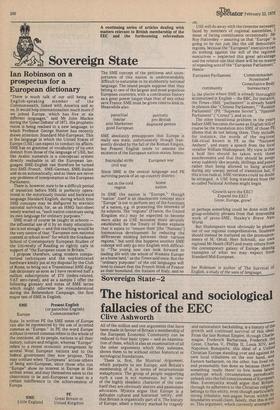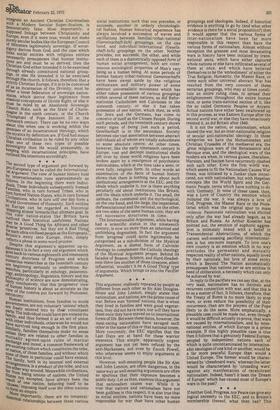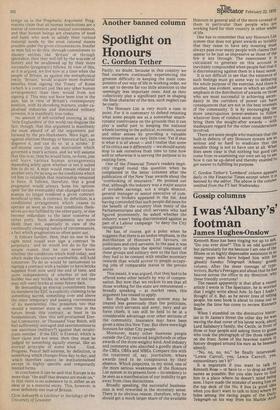Sovereign State-2
The historical and sociological fallacies of the EEC
Clive Ashworth
All of the million and one arguments that have been made in favour of Britain's membership of the European Economic Community can be reduced to four basic types — and an examination of them, which is also an examination of all the other arguments which they subsume, shows them to be without either historical or sociological foundations.
There is, first, the Mystical Argument, which purports to see Europe, and Britain's membership of it, in terms of incarnationist metaphysics. The group of people supporting such a case is not numerous, but in view of the highly idealistic character of the case itself they are obviously sincere and passionate advocates. Mystics argue that Europe is a definable cultural and historical 'entity,' and that Britain is organically part of it. The history of Europe, albeit a history marked by tragedy
• and nationalistic backsliding, is a history of the growth and continued survival of this ideal. From the late Roman Empire, through Charlemagne, Frederich Barbarossa, Frederich the Great, Charles V, Philip II, Louis XIV, and Napoleon Bonaparte, this ideal of a United Christian Europe standing over and against it own local tribalisms on the one hand, an' Eastern barbarism, on the other, has lived on, and presumably has done so because there is something 'really there' to live, some latent archetype which circumstances periodicallY unleash into the full consciousness of European Man. Euromystics would argue that' Britain, through its adherence to the Christian religion, belongs to this entity, even though particularlY strong tribalistic non-pagan forces within its boundaries would claim, falsely, that this is not so. This argument, which currently attempts t° integrate an Ancient Christian Universalism With a Modern Secular Super-Statism, is demonstrably false. Most importantly, a supposed linkage between Christianity and Europe, even if it were true, would not make Purely secular bodies like the European Council of Ministers legitimately sovereign. If sovereignty derives from God, and the case which links social entities with religious entities necessarily presupposes that human institutions are and must be so derived, then the Christian God either intended it to be exercised through already constituted national groupings, or else He intended it to be exercised through His church. It follows, therefore, that a strictly Christian Europe, if it is to be conceived of as an incarnation of the Divinity, must be either a loose federation of sovereign nationstates, which derive their legitimacy from classical conceptions of Divine Right, or else it must be ruled by an Absolutely Sovereign Church State, such as the State of Charlemagne in the ninth century, or the Church Triumphant of Pope Innocent III in the thirteenth century. There can be no two ways about this when one is working within the Premises of an incarnationist theology, which the mystics by definition are. If God had meant Christian civilisation to be ruled by any other than one of these two types of possible sovereignty then He would presumably, in keeping with incarnationist principles, have outlined His intentions accordingly.
The second type of argument put forward by Pro-Europeans can be called the Internationalist Argument. The view of human history held by internationalists runs approximately as follows. In the beginning there were Individuals, These Individuals subsequently formed Families, who in turn formed Tribes, who in turn formed Nation-States, who in turn formed Civilisations, who in turn will one day form a World Government of Humanity. Such entities aS Europe can be regarded as historical 'stepping stones' towards that ultimate goal. In this view nation-states like Britain have outlived their historical usefulness. Nations rnaY be A Good Thing for Africans and otherl diverse `primitives,' but they are A Bad Things Lor such ultra-civilised people as the Europeans.1,_„. ritain's entry into Europe, then, simply reflects a phase in some word process. Despite this argument's apparent up-todateness it is in fact a very old argument which goes back to various eighteenth and nineteenth century doctrines of Progress and which numerous researches in the twentieth century are beginning seriously to undermine. Real earches, particularly in ethology, palaeontoeNp anthropology, linguistics, history and the 13„..osophy of science are now demonstrating, „tIrlY conclusively, that this 'progresive' view v”! human history is about as accurate as the levy of the cosmos put forward by Ptolomeic astronomy. Human institutions, from families to world :overnments, are not voluntary 'unions' which re freely entered into by their constituent parts. The individual could have pre-existed the ,,,r1111Y, and thus formed it as an act of union "Other individuals, otherwise he would not slye survived long enough in the first place. u TilarlY, families themselves make no sense ess they are related to other families in Mxutually agreed-upon rules of marital epr:hange and incest, a common framework of or" existing culture which constitutes the tribe, _ °nation, of those families, and without which 14hrie of them in particular could have existed. arre, family, both in its internal and external " ti,:ngements, is a product of the tribe, and not fare pther way around. Meanwhile civilisations, Statpr°111 being unions of nations, the United resu7e not excepted, have always been the it of one nation, believing itself to be to 1r en,imposing itself over the other nations ,SIrm an empire. Importantly, there are no temporal/ 'erotical relationships between these various social institutions, such that one precedes, or succeeds, another in orderly chronologic cal fashion. Human historical experience has always involved a succession of waves and oscillations between familial/tribal/national (Ganeinschaft-lich) groupings, on the one hand, and individual/international (Gesellschaft-lich) groupings on the other. Neither precedes, not succeeds, the other, and while each of them is a diametrically opposed form of human social arrangement, both are coterminous sociological properties of .Man's very being as a human being. At some periods or human history tribal/national Gemeinschafts have been swept aside by the religious enthusiasm and military power of some abstract universalistic movement which has either taken possession of various groupings within several of these nations, as did" Reformationist Catholicism and Calvinism in the sixteenth century, or else it has taken possession of one nation, which then, as with the Jews and the Germans, has come to conceive of itself as the Chosen People. During such periods, and the twentieth century shows many signs of being just such a period, Gesellschaft is in the ascendant. Society becomes one vast association between abstract individuals all of whom are totally subordinate to some absolute centre. -At other times, however, like the early nineteenth century in Europe, vast and decrepit institutional shells left over by these world, religions have been broken apart by a resurgence of polytheistic nationalisms, which at the time take a semi, or even fully, religious form. In other words an examination of the facts of human history shows that there is nothing new about such institutional arrangements as the EEC, and the ideals which underlie it, nor is there anything peculiarly old about institutions like Britain, and the ideals which underlie it. The small, the intimate, the communal and the mythological,, on the one hand, and the large, the impersonal, theassociational and the rational, on the other, are two sides of the same human coin; they are not successive structures in time.
The Internationalist Argument, while having had a scientific status in the nineteenth century, is now no more than an inherited and unthinking dogmatism. In . fact the argument from `progress' could suite legitimately be ,categorised as a sub-division of the Mystical Argument, as a dismal form of Calvinist theology to complement the Catholic theology of the Mystical Argument proper. Behind its facades of Reason, Science, and Hard-Headedness there lies another of those tiresome, albeit influential, 'wouldn't it be A Good Thing' type of arguments. Which brings us into the Pacifist Argument.
This argument, endlessly repeated by people as different from each other as Sir Alec DouglasHome and John Lennon, simply states that nationalism, and nations, are the prime cause of war. Before men `formed' nations, that is when they lived in families and were good vegetarians, they did not have wars, nor will they have them once they have moved on to international forms of life. Between these dates, however, the meat-eating nationalists have savaged each other in the name of this or that national totem. More concretely, the EEC signifies that the Last Days are at hand for these warrior elements. This simple, apparently cogent argument has not yet been refuted by the anti-Marketeers, not even by Enoch Powell, who otherwise seems to enjoy arguments at this level.
However, well-meaning people like Sir Alec and John Lennon, are often dangerous, in the same way as well-meaning arguments are often so spurious that their exposure becomes a public duty. Let us then, examine this argument that nationalism causes war. While it is true that nations and nationalism have not been guiltless in this respect, it is also true that as social entities, nations have been no more responsible for war than have other human groupings and ideologies. Indeed, if historical evidence is anything to go by (and what other evidence is there for a social proposition?) then it would appear that the various forms of inter-nationalism have been far more responsible in this respect than have the various forms of nationalism. Almost without exception the greatest and most devastating wars in history have been initiated by transnational sects, which have either captured whole nations or else have infiltrated several of them at once, and which have believed themselves to be the 'embodiment' of either the True Religion, Humanity, the Master Race, or some such other universal abstract War has resulted from the very concern of these sectarian groupings, who may at times constitute an entire ruling class, to spread their enlightenment throughout the entire human race, or some trans-national section of it, like the so called Germanic Peoples or Aryans. Actual nations have either been swallowed up in this process, as was Eastern Europe after the second world war, or else they have tenaciously resisted it, as did Britain after 1940.
It is not the nation, or nationalism, which caused the war, but an inter-nationalist religion or secular anti-nationalist ideology. In these categories we have the Mohammedan and Christian Crusades of the mediaeval era, the :great religious wars of the Renaissance and Baroque eras, and the ideological wars of the modern era when, in various guises, liberalism, Marxism, and fascism have recurrently clashed with each other. Even the first world war, which seems to fit the Nationalism Causes War thesis, was initiated by a Junker class intoxicated, not with nationalism, but with Hegelian concepts like the World Spirit and the Germanic People, terms which have nothing to do with 'Germany.' In none of these cases, then, was a Love of Country the emotion which initiated the war, it was always a love of God, Progress, the Master Race or the Proletariat which was the original spur to mass violence. Passionate nationalism was elicited only after the war had already begun, as in Britain and Russia. As Arthur Koestler has pointed out, the emotion of euphoric aggression is intimately linked with a belief in Transendental Abstractions, of which the current well-meaning pacifistic internationalism is but one more example. To love one's own country is an emotion which in no way precludes the permanent and mutually respected reality of other nations, equally loved by their nationals, but love of some entity which is Beyond The Nation automatically presupposes that nations per se are entities in need of obliteration, a necessity which can only be achieved by war. In reply to the pacifists we can say that, at the very least, nationalism has no intrinsic and recurrent connection with war, and that this is so as a matter of fact. It follows, therefore, that the Treaty of Rome is no more likely to stop wars, or even reduce the possibility of their occurrence, than are the prayers of the Pope likely to do the same. More emphatically, a plausible case could be made out, even though it would be difficult actually to prove, that wars are caused by internationalism, and by international entities, of which Europe is a prime example. If this highly plausible case is true then it follows that a genuinely Federal Europe, peopled by independent nations each of which is quite uncontaminated by internationalist ideologies of one kind or another, would be a far more peaceful Europe than would a United Europe. The former would be characterised by 'chessboard wars,' whereas the latter would be characterised by 'crusading wars', against any manifestation of recalcitrant nationalism. Indeed, hasn't it been the 'Dream of Europe' which has caused most of Europe's wars in the past?
If neither God, Progress, nor Peace can give any logical necessity to the EEC, and to Britain's membership thereof, what then can? This brings us to the Pragmatic Argument. Pragmatists claim that all human institutions are a matter of convention and mutual convenience, and that human beings are creatures of need and habit who seek to satisfy their various material needs by the most rational means possible under the given circumstances. Insofar as men fail to do this, through commitment to illusory entities like 'Britain' or through ignorance, then they will fall by the wayside of history and be swallowed up by their more successful (pragmatic) fellows. In view of this, so it is argued, we live now at a time when the people of Britain, as against the metaphysical entity, 'Britain,' would acquire more material benefits from signing the Treaty of Rome (which is a contract just like any other human arrangement) than they would from not signing it. This may not have been true in the past, but in view of Britain's contemporary position, with its shrinking markets, under-capitalised industries and diminished military prowess, it is manifestly true today.
No amount of self-satisfied sneering at the 'little Englanders' of this world can disguise the fact, though, that this argument is manifestly the most absurd of all the arguments put forward by the pro-Marketeers. Mere logic, as against abstruse theology or historical fact, can disprove it, and can do so 'at a stroke.' It self-interest were the sole motivation which governed a man's actions, and we will assume that this is so, then he would form, re-form, join and leave various human arrangements depending solely upon whether or not it suited him to do so. A man would remain related to another only for so long as the conditions which led him to establish that relationship remained in force. It follows, therefore, that a good pragmatist would always 'keep his options open' for the eventuality that changed circumstances no longer rendered a given contract beneficial to him. A contract, by definition, is a conditional arrangement which ceases to operate as soon as the said conditions themselves are not fulfilled by the other party, or else become redundant to the later concerns of either party. Such developments are more likely than not, especially in view of the continually changing nature of circumstances, a fact which pragmatists so often point out.
It follows further, then, that no one in his right mind would ever sign a contract 'in perpetuity,' and he would not do so for the simple reason that he can never know whether the conditions which hold today, and which make the contract worthwhile, will hold tomorrow. To do so would be tantamount to signing a contract with a builder to have bricks supplied from now until the end of time, and quite independently of whether or not the builder has any bricks, or whether or not one may still want bricks at some future date. By demanding an eternal commitment from its members the EEC is explicitly claiming to be something sacred, something over and above the mere temporary and passing convenience of its membership. One presumes too that should a member state at some time in the future break this contract, at least in its fundamentals, then this self-proclaimed Eternal Community, or Thousand Year Reich, will feel sufficiently outraged and sanctimonious to use sanctions (military?) against that recalcitrant member . If the EEC is Eternal, which is their claim and not mine, then they must be judged by something equally eternal, like an eternal principle of some kind God, Progress, Peace! Self-interest, by definition, is something which changes from day to day, and which therefore cannot be institutionalised except in highly specific and temporarily limited forms.
In conclusion it can be said that Europe is no more than "the stuff that dreams are made on," in that there is no substance to it, either as an ideal or as a material entity. This, however, is most definitely not true of Britain.
Clive Ashworth is Lecturer in Sociology at the University of Leicester.




































 Previous page
Previous page